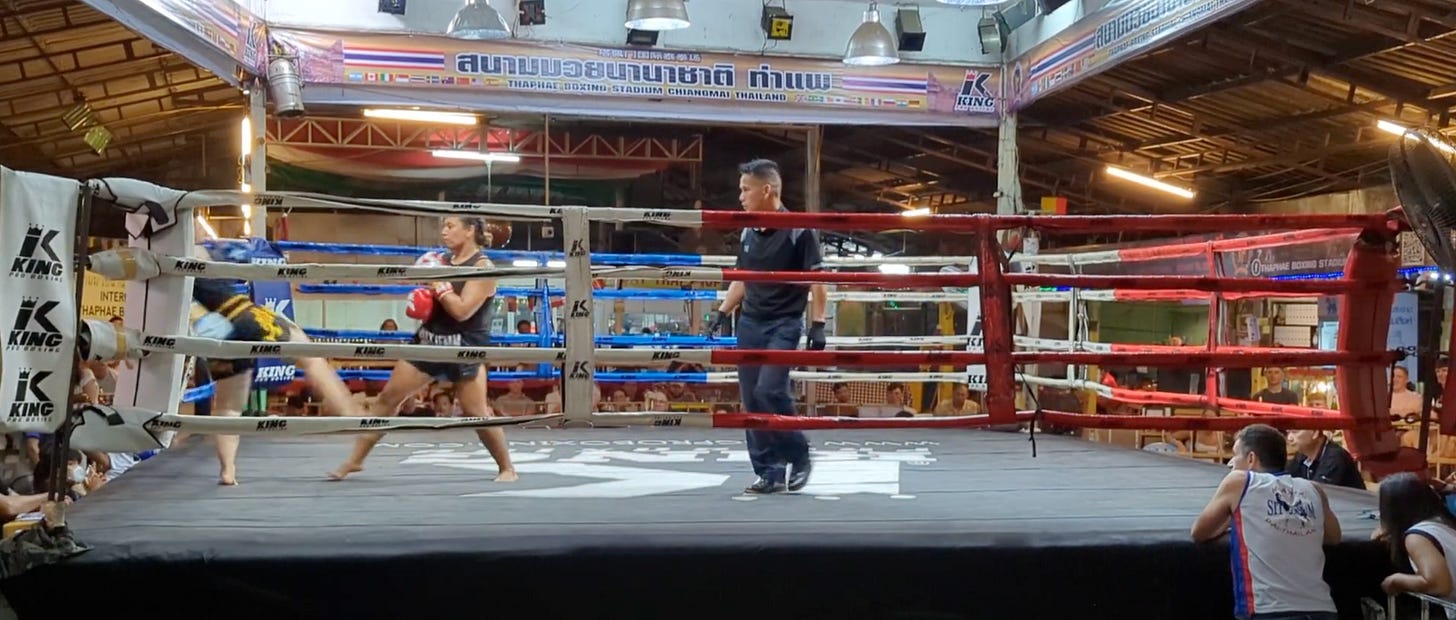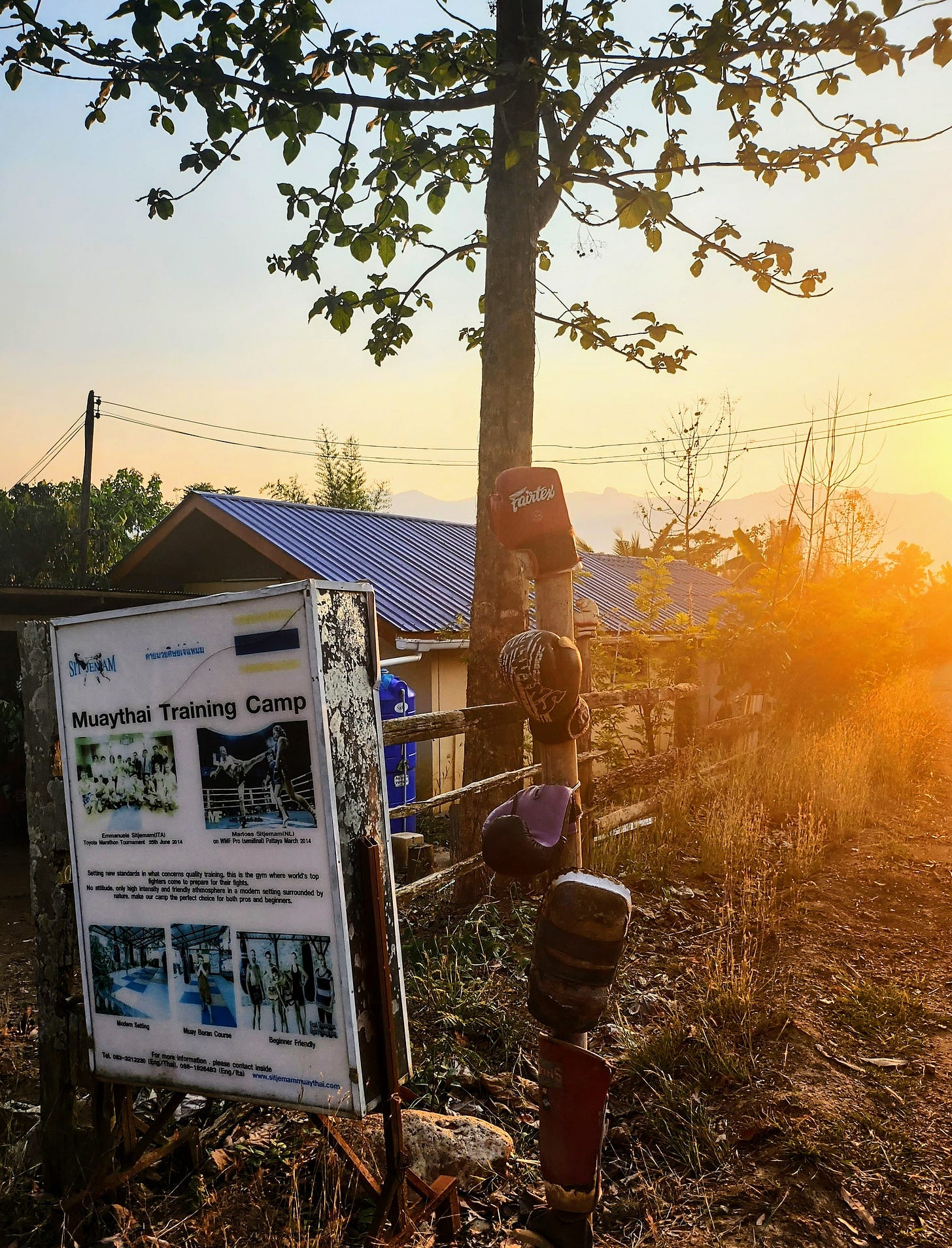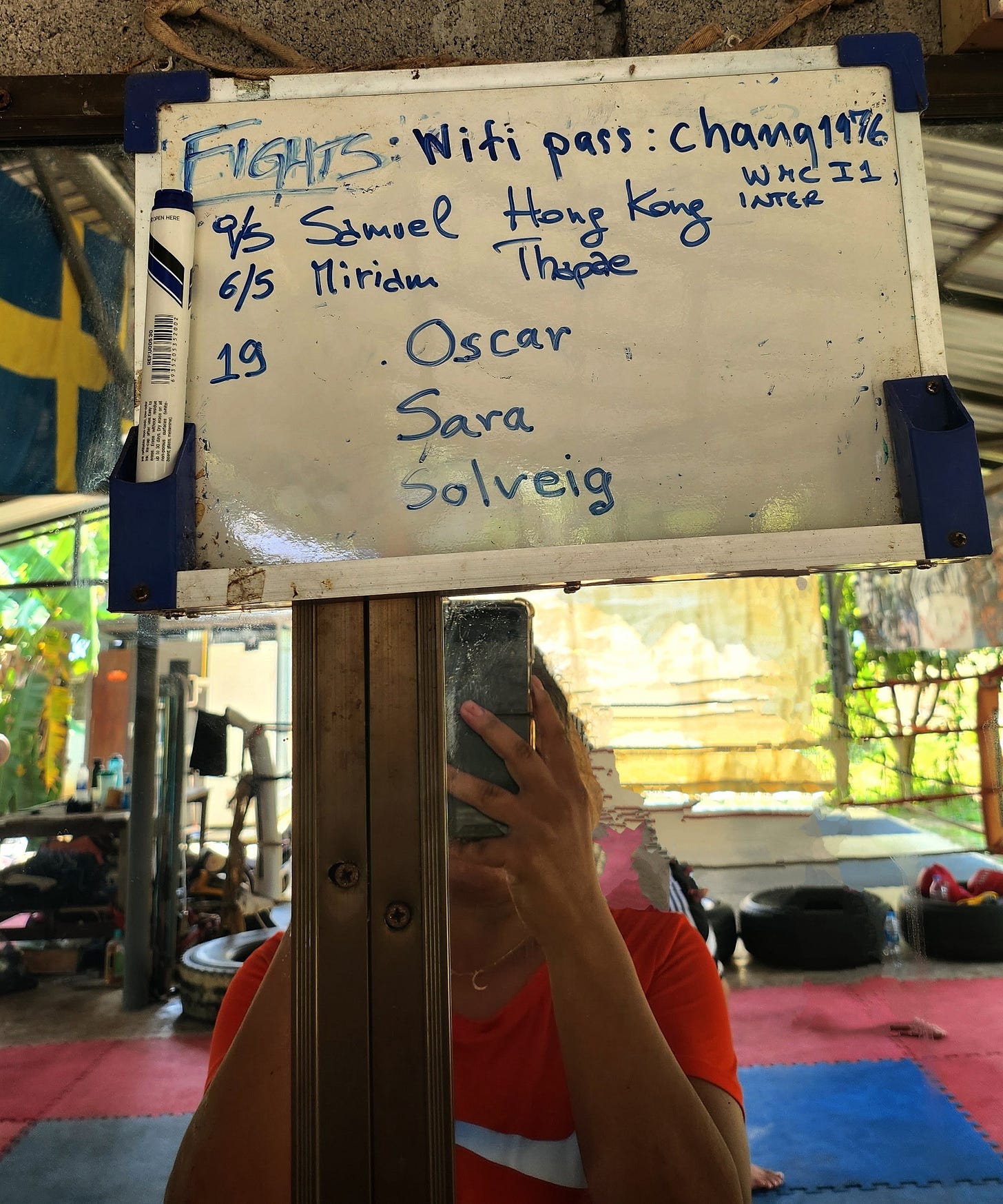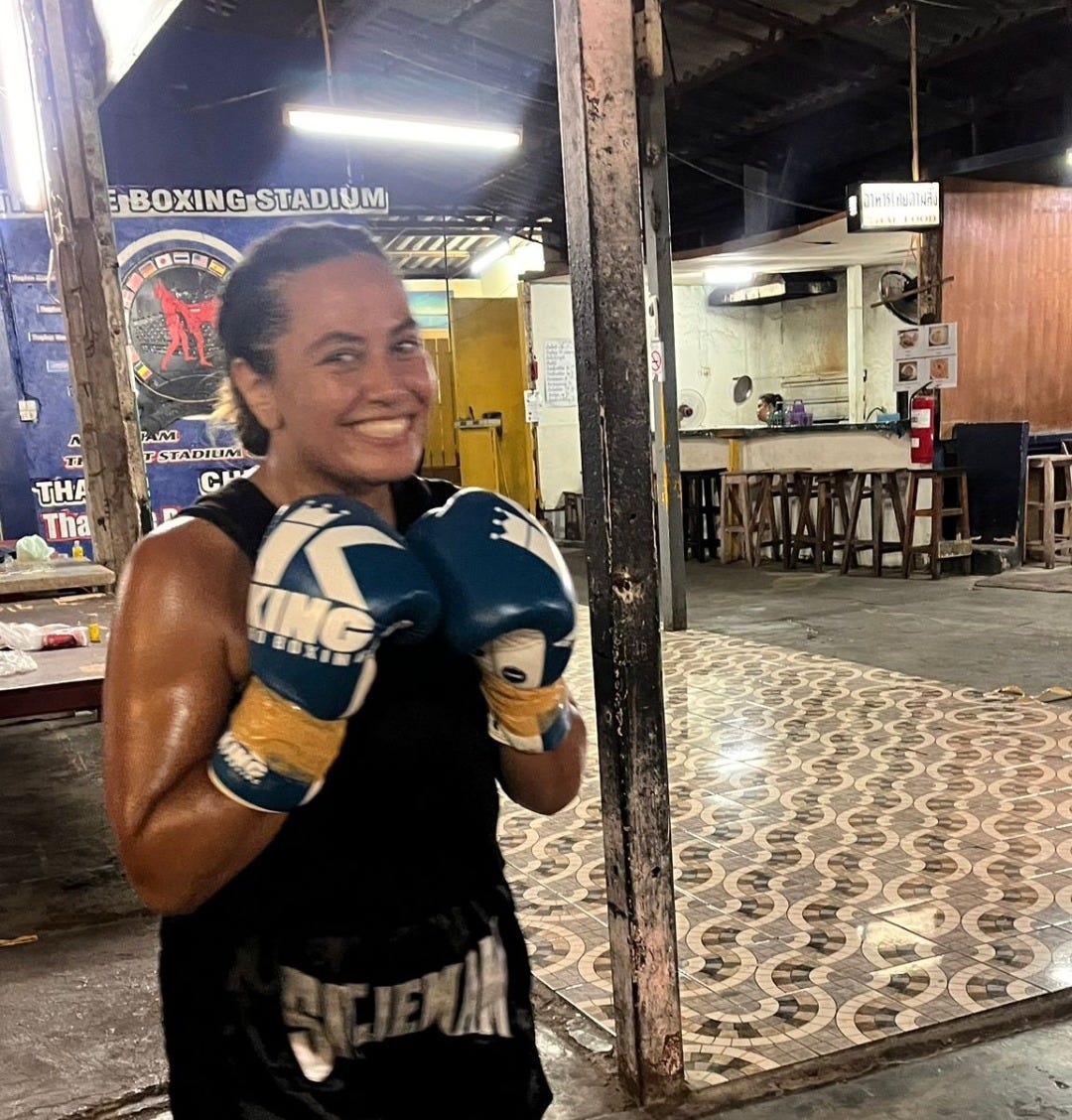What Getting Punched in the Face Taught Me About Presence
On Muay Thai, self-doubt, and the victories that matter
My skin was slick with Thai oil and sweat when I turned to face my opponent. As I watched her bouncing on her toes — her face poised, her posture self-assured — I had to take a few deep breaths. In through the nose, out through the mouth, an intentional attempt to calm the panic crawling up my spine.
It was my first amateur Muay Thai fight, the culmination of nearly five months of intensive training in the smoky jungles of northern Thailand. I had practiced for this moment — perfecting my left kick, memorizing an epic sweep + upper cut combo that I practiced relentlessly during sparring, hitting the bag until the skin on my knuckles and toes ripped and bled. Not to mention the emotional exertion, my mind doing mental backflips as I constantly questioned what the hell I was getting myself into.
But no amount of training can prepare you for what it feels like to be in a crowded stadium, standing in the ring across from someone who really, really wants to hit you. Or what it takes to stay calm and focused when you’re experiencing a full-blast assault on your senses. The searing, bright heat from the overhead lights. The pungent, burning scent of menthol and eucalyptus from the Thai oil, which has been rubbed onto my whole body. The pre-fight music, known as the Sarama, erupting from the speakers, all woodwind instruments, barrel drums and cymbals. Everything was coming at me all at once, and yet the loudest sound I heard was the voice in my head, calmly repeating you got this.
I didn’t plan to fight when I first arrived in Pai, a small bohemian town in northern Thailand’s Mae Hong Son province, at the tail-end of 2022. My best friend and I had just completed a hectic month-long trek through Vietnam, touring the lowland rainforest on motorcycles, dodging nerve-wracking traffic in Hanoi and downing endless bowls of spicy pho. By the time we crossed the border into Thailand, our bodies were craving structure and sweat, and a routine that prioritized physical movement.
We found Sitjemam Muay Thai after sifting through various lists of the country's best gyms. Tucked into a small plot in Na Jalong village (just a 10 minute drive from town), the outdoor camp overlooks the misty Pai Valley, a stunning landscape of rice fields, rolling green hills and lush mountains. It was remote, but welcoming.
The schedule was organized in a way that provided the perfect balance: two, two hour sessions a day, with enough time between to do whatever we wanted. We started our day at 8 am, riding our baby blue scooter through the winding, sun-drenched landscape. After sweating through the morning class, which focussed mostly on learning the proper form and working on combinations, we’d head into town to enjoy steaming plates of green curry and pad see ew, down as much caffeine as we could handle, and nap in the sun.
Afternoons were more intense — bag work, sparring, clinching, and what felt like endless ab exercises. By evening, our bodies were wrecked in the most satisfying way. We headed back to our cabins drenched in sweat (ours and other people’s), our muscles aching, bruises already blooming on our arms and legs.
We only planned to stay in Pai till the end of January before moving on to explore the country’s islands. But by the time February rolled around, I was hooked (my bestie less so, but she stuck around for my sake). We extended our stay for another month, and I leaned hard into the training. My friend decided to leave after that, while I continued on, the second month stretching into a third and fourth.
In that time, I’d watched so many of my friends face off in the ring, some winning, some losing but all of them transformed by their experiences. I knew that my time as a spectator couldn’t last much longer, that soon I’d be the one squaring up for a fight. And I wanted it — not the adrenaline or the spectacle per se, but the opportunity to challenge myself in a more active way. So when my coaches brought it up, lightly at first, then more seriously, I said yes.
With my name finally on the board and a date set, I entered fight camp. Mornings began with 5 km runs through the misty hills, followed by sprint drills on the sloped road in front of the gym. Each session included four to five rounds of pad work, endless clinching, fight-for-your-life sparring, and kicking the heavy bag more than 500 times a day. The volume ramped up, the stakes felt higher, and there was no room left for half-assed effort.
It was the most physically taxing two weeks of my life. My muscles screamed, my shins bruised, swelled and hardened. I got kicked in the liver (I saw stars, do not recommend), punched in the face and tossed to the ground by people twice my size. But I also grew exponentially stronger, my limbs carved and tight, my mind steady and resilient, pushing me through the pain and fear even when I wanted to give up. I wasn’t necessarily ready for my fight, but I was prepared.
All of that training had brought me to this moment: the crowded Tha Pae Boxing Stadium in Chiang Mai, under the bright lights, standing across from a far more experienced Thai fighter who clearly, genuinely wanted to hit me. I was nervous, but also excited, the momentum of the past few months reaching its finale.
When the bell rang, I moved towards the center of the ring and my opponent and I touched gloves. I don’t remember much of what happened next, my brain blacking out and my body taking over. I moved forward, I struck, she struck back, the crowd erupting every time we made contact. My coach shouted at me from the corner: One two kick! One two kick! But my body refused to obey and instead searched for ways to inch towards her without getting hit. I was, of course, unsuccessful. We exchanged blows back and forth, and swept each other to the ground in the clinch… but I didn’t feel pain. I felt the pressure of her kicks, the crash of her gloves against my body, the weight of every fall, but it didn’t hurt.
It was as if my brain decided pain wasn’t useful at that moment, so it shut off those receptors, leaving more space for what my body did need, which was the ability to react, adapt, respond and persist. There was no time for flinching or second-guessing.
Time moved at a surreal pace, some moments dragging, others bursting ahead as if stuck in fast-forward. The first round blurred into the second, then the third. During the break between rounds, my coaches instructed me on how to counter her heavy front kick, which had already caught me in the stomach twice, and reminded me to breathe.
By the fourth round, I had thoroughly exhausted myself. My mouth guard felt too big, my lungs too small, my limbs too heavy. But I was determined to give it my all, to make the fight worth the five months of suffering I went through to get there. I kept throwing punches, kicks and knees, even when my arms and legs shook and my chest felt like it was on fire.
When it was over, five rounds of relentless effort and endurance, I stood in my corner, worn out and bruised. I lost the fight by a slim margin on points, but I wasn’t defeated. I’d done the thing I came to do, even if I hadn’t planned to do it in the first place. I’d confronted enormous fears – performing in front of a huge audience, failing in front of a huge audience, embarrassing myself, forgetting everything I’d learned – and walked away stronger and feeling deeply accomplished.
I proved to myself in that moment that sometimes it’s genuinely and unabashedly more important to show up than to win. I hadn’t planned to lose, and I won’t pretend I wasn’t disappointed. But when it was over, what lingered wasn’t the sting of defeat. It was the quiet pride in having faced my fear head-on and an overwhelming sense of achievement.
As a chronic over-thinker, this felt like a radical shift. I’ve spent so much of my life analyzing every decision from every angle, convincing myself that I needed just a little more time, more skill, more proof I was ready. I thought that was being careful. Thoughtful. Smart. But underneath it, if I’m honest, I was just afraid of not being good enough.
In the lead-up to this fight, I didn’t have the luxury of overthinking. There was no space to stall, no perfect version of myself waiting just one more month down the line. I had to trust in the skills I’d acquired, trust the training, and trust myself.
That was the real fight: not against my opponent, but against self-doubt, fear and the persistent ache of perfectionism. That quiet, private act of choosing to believe in myself meant more than any win ever could.
In that, I found my own kind of victory.
.








Very brave! And what a transformative experience, showing yourself what you’re made of. I shared this with my bestie, she’s a BJJ competitor, and she resonated with your story big time and loved the overall takeaway!
Great story! Those last 3 paragraphs hit me in the face haha love that you competed and succeeded💪